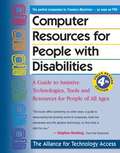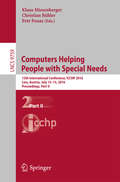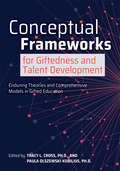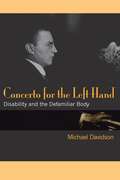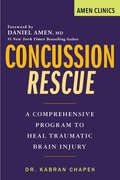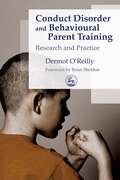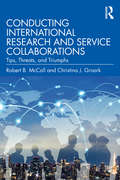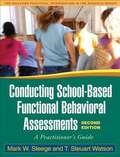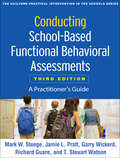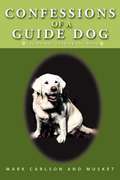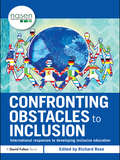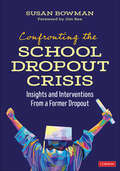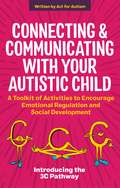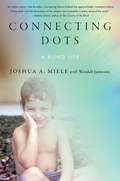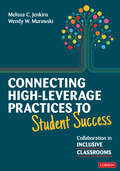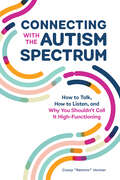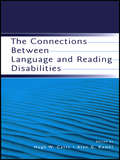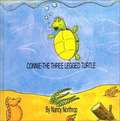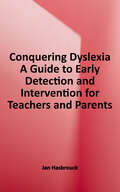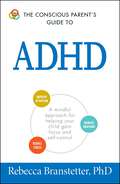- Table View
- List View
The Comprehensive Guide to Special Education Law: Over 400 Frequently Asked Questions and Answers Every Educator Needs to Know about the Legal Rights of Exceptional Children and their Parents
by George A. GiulianiIt is vital for all professionals in the field of education to have a practical understanding of the laws that are in place to protect the children with whom they work. The Comprehensive Guide to Special Education Law is a detailed yet accessible introduction to federal law as it applies to the rights of children with special needs. Written in a user-friendly question and answer format, the book covers all of the key areas of special education law including parental rights of participation, the legal right to Free Appropriate Public Education (FAPE) and related services, and the complex issues of discipline and dispute resolutions. This book provides educators with knowledge of the requirements, history, and evolution of the laws that impact their daily working lives and gives them the information they need to help parents obtain better services for their children. This is an indispensible handbook that teachers, school management, and school counselors will refer to again and again.
Computer Resources for People with Disabilities
by Alliance for Technology AccessA resource for people with disabilities who want to improve their lives through the use of technology.
Computers Helping People with Special Needs: 15th International Conference, ICCHP 2016, Linz, Austria, July 13-15, 2016, Proceedings, Part II (Lecture Notes in Computer Science #9759)
by Klaus Miesenberger Christian Bühler Petr PenazThe introduction to the 1st International Conference on Computers for Han- cappedPersons(Vienna,1989)byAMinTjoa(UniversityofVienna)andRoland Wagner(UniversityofLinz)?nishedwiththefollowingmissionstatementonthe "Future Direction on Computers for Handicapped Persons": "The di'erent themes show that a lot of problems are solved by the usage of computer technology for helping handicapped persons, for instance for the blind and visually handicapped. A consequence of the discussed themes there are two directions which should be done in the next years. One direction is obvious. The tools must be improved and research and development work should be extended to all groups of handicapped (even if they are numerically not so large as for instancetheblindorvisuallyhandicappedpersons). Ontheothersideinthearea of social implications there is an increasing demand on social science studies on overall computer use among disabled persons. Because sources are in principle missing today about disabled persons work tasks, research in this ?eld must begin by trying to survey this aspect. Particular attention should be paid to the extent and character of computer use among the handicapped in work life. There are a lot of questions, which should be answered during the next years for reaching the aim of rehabilitation. " Fifteen years later the 9th International Conference on Computers Helping People with Special Needs (Paris, 2004) o'ered a comprehensive and deepened view on general awareness,special research and individual applications conce- ing disabled people and their participation in our society.
Conceptual Frameworks for Giftedness and Talent Development: Enduring Theories and Comprehensive Models in Gifted Education
by Tracy Cross Paula Olszewski-KubiliusConceptual Frameworks for Giftedness and Talent Development explores current and enduring theories and comprehensive models of giftedness and talent development. Each chapter:Includes a description of a different model, theory, or framework.Shares the most important implications of each model, including underrepresentation and social justice issues.Provides commentary on how each model compares to others.Includes discussion questions for use with students and professionals.The editors also consider common issues across conceptual frameworks, such as the degree to which achievement defines giftedness, the goal of gifted education, and the role of psychosocial factors. This is a comprehensive reference for scholars and practitioners in the field, as well as those studying at the graduate level.
Concerto for the Left Hand: Disability and the Defamiliar Body
by Michael DavidsonConcerto for the Left Hand is at the cutting edge of the expanding field of disability studies, offering a wide range of essays that investigate the impact of disability across various art forms---including literature, performance, photography, and film. Rather than simply focusing on the ways in which disabled persons are portrayed, Michael Davidson explores how the experience of disability shapes the work of artists and why disability serves as a vital lens through which to interpret modern culture. Covering an eclectic range of topics---from the phantom missing limb in film noir to the poetry of American Sign Language---this collection delivers a unique and engaging assessment of the interplay between disability and aesthetics. Written in a fluid, accessible style, Concerto for the Left Hand will appeal to both specialists and general audiences. With its interdisciplinary approach, this book should appeal not only to scholars of disability studies but to all those working in minority art, deaf studies, visual culture, and modernism. Michael Davidson is Professor of American Literature at the University of California, San Diego. His other books include Guys Like Us: Citing Masculinity in Cold War Poetics and Ghostlier Demarcations: Modern Poetry and the Material World.
Concussion Rescue: A Comprehensive Program to Heal Traumatic Brain Injury
by Kabran ChapekDaniel Amen and The Amen Clinics have become widely known and respected across America and internationally via television, print, and the online world reaching millions of viewers and consumers each year. We now have the wonderful opportunity to publish a line of health care books under the Amen Clinics imprimatur.#1 New York Times bestselling author, Daniel Amen, will write a foreword for each book and promote the book through all of his channels (mailing list, newsletter, social media). The first book we will be publishing is Concussion Rescue, which will give readers the natural and effective protocols for healing from traumatic brain injury.In Concussion Rescue, Dr. Kabran Chapek shares the programs and protocols that he uses at the Amen Clinics to put patients on the pathway to healing from traumatic brain injury. From general assessment using sophisticated tools (SPECT imaging, MRIs and CAT scans) to very specific blood tests (out-of-balance lab values in blood can point to symptoms of brain injury and may explain why the brain is not healing), Dr. Chapek guides readers to getting the proper medical care. He shares the cutting edge and most effective treatments for acute traumatic brain injury, as well as chronic traumatic brain injury, and provides the most powerful natural treatments including diet and supplements. Concussion Rescue will be an invaluable and potentially lifesaving resource for athletes, parents of student athletes, coaches, and anyone who suffers a mild or severe brain injury.
Conditions of a Heart
by Bethany MangleFor fans of Talia Hibbert and Lynn Painter comes a funny and unflinchingly honest story about a teen who must come to terms with her disability and what it means for her identity, her love life, and her future.Brynn Kwan is desperate for her high school persona to be real. That Brynn is head of the yearbook committee, the favorite for prom queen, and definitely not crumbling from a secret disability that&’s rapidly wearing her down. If no one knows the truth about her condition, Brynn doesn&’t have to worry about the pitying looks or accusations of being a faker that already destroyed her childhood friendships. She&’s even willing to let go of her four-year relationship with her first love, Oliver, rather than reveal that a necessary surgery was the reason she ignored his existence for the entire summer. But after Brynn tries to break up a fight at a pep rally and winds up barred from all her clubs and senior prom, she has nothing left to prop up her illusion of being just like everyone else. During a week-long suspension from school, she realizes that she doesn&’t quite recognize the face in the mirror—and it&’s not because of her black eye from the fight. With a healthy sister who simply doesn&’t understand and a confused ex-boyfriend who won&’t just take a hint and go away like a normal human being, Brynn begins to wonder if it&’s possible to reinvent her world by being the person she thought no one wanted: herself.
Conduct Disorder and Behavioural Parent Training: Research and Practice
by Dermot OreillyProgress made with children with conduct disorder in specialist schools often does not transfer to the home, but this book shows how behavioural parent training and applied behaviour analysis can help professionals work with parents to continue improving their child's behaviour. Conduct Disorder and Behavioural Parent Training provides a comprehensive introduction to the field of conduct disorder and the individual, familial and social factors that influence the development of persistent antisocial behaviour. The author presents thorough evidence for the effectiveness of the following aspects of behavioural parent training: * compliance training * encouraging good behaviour through praise, enthusiasm and attention * using `time out' as an effective punishment technique * transfer of improvements to school setting * effects of treatment on the child's siblings. He considers the relative impact and costs of different settings for parent training, and outlines ethical issues and future directions for research in this area. This book is essential reading for all professionals involved in the care of children with conduct disorder, as well as psychology and social work students and academics.
Conducting International Research and Service Collaborations: Tips, Threats, and Triumphs
by Robert B. McCall Christina J. GroarkConducting International Research and Service Collaborations: Tips, Threats, and Triumphs provides academic researchers, as well as non-profit and private professionals, with much-needed guidance on how to plan, implement, and manage international research and intervention projects. Accessibly written and illustrated throughout with examples and case studies of projects from Robert B. McCall and Christina J. Groark's wide-ranging and decades-long experience of cross-border collaborations, this book outlines how to prepare for and ensure success of cross-border research projects and interventions, how to embrace unique circumstances you may encounter, and what to do if things go wrong. Each chapter covers a general domain of concerns, advice, and lessons learned in conducting international collaborative projects followed by concrete illustrations that pertain to them. Key topics covered include launching projects and working with stakeholders, travelling and living abroad, cultural considerations, planning and funding, administrative issues, dealing with crises, and successfully implementing and disseminating findings effectively. This comprehensive guide is ideal for researchers and project managers – from large, global organizations to small NGOs, human services, private industry, and other fields embarking on such projects, as well as university students and academics.
Conducting School-Based Functional Behavioral Assessments, Second Edition
by T. Steuart Watson Mark SteegeExplaining the "whats," "whys," and "how-tos" of functional behavioral assessment, this practical and engaging book is packed with real-world tools and examples. Effective procedures are presented for evaluating challenging behavior in K 12 students, organizing assessment data, and using the results to craft individualized behavior support plans. The authors draw on extensive school-based experience to provide sample reports, decision trees, and reproducible checklists and forms all in a large-size format with lay-flat binding to facilitate photocopying. New to This Edition Revised throughout to reflect significant advances in the field. Provides an updated conceptual model for understanding behavior. Three new chapters cover brief functional analysis, behavior-analytic problem solving, and direct behavioral consultation. Fully updated coverage of legal issues under IDEIA. Includes revised forms and sample reports.
Conducting School-Based Functional Behavioral Assessments, Third Edition: A Practitioner's Guide (The Guilford Practical Intervention in the Schools Series)
by Mark W. Steege Jamie L. Pratt Garry Wickerd Richard Guare T. Steuart Watson Frank M. GreshamWidely recognized as a gold-standard resource, this authoritative book has been revised and expanded with 50% new material. It provides a complete introduction to functional behavioral assessment (FBA), complete with procedures, forms, and tools that have been piloted and refined in both general and special education settings. Numerous vivid examples illustrate how to use the authors' behavior-analytic problem-solving model (BAPS) to synthesize assessment results and guide the design of individually tailored interventions. Practitioners and students enjoy the engaging, conversational tone. In a large-size format with lay-flat binding for easy photocopying, the book includes 17 reproducible checklists and forms. Purchasers get access to a companion Web page where they can download and print the reproducible materials. New to This Edition *Revised BAPS model reflects the latest research and offers a more comprehensive approach to FBA. *Chapters on professional and ethical standards; analyzing how biological/medical conditions, thoughts, and emotions influence behavior; and analyzing how executive skills deficits influence behavior. *Chapters on testing hypotheses about the functions of problem behavior; testing reinforcer effectiveness; and evaluating function-based interventions. *Chapter providing applied learning experiences for professionals and students. *Most of the reproducible tools are new or revised. This book is in The Guilford Practical Intervention in the Schools Series, edited by T. Chris Riley-Tillman.
Confessions of A Guide Dog: The Blonde Leading the Blind
by Mark Carlson MusketHave you ever wondered what a guide dog does? How do they know to lead a blind owner? Can they understand traffic lights? Most importantly, how does the owner know where to pick up the poop? This memoir answers these questions-and more. It tells what guide dogs are supposed to do. In this book, Mark and Musket tell their story with humor and emotion.
Confronting Obstacles to Inclusion: International Responses to Developing Inclusive Education (nasen spotlight)
by Richard RoseConfronting Obstacles to Inclusion uniquely and comprehensively addresses interpretations of inclusive education by drawing upon the experiences and expertise of leading writers and academics who have direct experience of teaching and researching this area around the world. This landmark publication combines theoretical chapters with practical material demonstrating how the theories can be put in to action in the classroom. The contributors, who all have regular contact with pupils and teachers in inclusive settings, provide a broad spectrum of ideas, examine a number of key themes and interpret these in an international context, such as: the causes of exclusion, the obstacles to inclusion and how these can be overcome supporting families how we can learn from students professional development enhancing teaching and learning support in the classroom. This authoritative text will be of immense interest and use to practitioners, policy-makers, researchers and campaigners who are working towards a more equitable and inclusive society. Through a synthesis of theory and practice the book offers readers an opportunity to explore local, national and international perspectives and raises questions with regards to our current understanding of inclusion. Whilst the interrogation of the concept of inclusion is, in itself important, the book provides examples of professional approaches to the key questions which are currently challenging the education of a diverse range of learners.
Confronting the School Dropout Crisis: Insights and Interventions From a Former Dropout
by Susan BowmanReach out before they drop out Student dropout rates continue to soar, despite decades of funding, research, programs, and professional development initiatives. This is a wakeup call. Written by a former school dropout, Confronting the School Dropout Crisis encourages educators and related professionals to discover and explore the sometimes unnoticed reasons that youth drop out of school. With fresh strategies for prevention and intervention, this critical resource includes: How to reach and recover students who are at risk of dropping out or who already have Clear, impactful strategies that better engage and positively impact students who are at risk Moving personal stories from teens and the author Confronting the School Dropout Crisis invites you to rethink how you address real dropout issues with young people and how to incorporate fresh approaches to better reach and positively impact these students and their caregivers—before it’s too late.
Confronting the School Dropout Crisis: Insights and Interventions From a Former Dropout
by Susan BowmanReach out before they drop out Student dropout rates continue to soar, despite decades of funding, research, programs, and professional development initiatives. This is a wakeup call. Written by a former school dropout, Confronting the School Dropout Crisis encourages educators and related professionals to discover and explore the sometimes unnoticed reasons that youth drop out of school. With fresh strategies for prevention and intervention, this critical resource includes: How to reach and recover students who are at risk of dropping out or who already have Clear, impactful strategies that better engage and positively impact students who are at risk Moving personal stories from teens and the author Confronting the School Dropout Crisis invites you to rethink how you address real dropout issues with young people and how to incorporate fresh approaches to better reach and positively impact these students and their caregivers—before it’s too late.
Connecting and Communicating with Your Autistic Child: A Toolkit of Activities to Encourage Emotional Regulation and Social Development
by Tessa Morton Jane GurnettThis book teaches drama and immersive theatre-based activities for parents and professionals working with children and young people on the autism spectrum. The exercises follow the author's simple, person-centred '3C pathway' of connecting, calming and communicating, and enable parents to gain an understanding of the challenges an autistic child may face by 'walking in their shoes', while empowering children to become more self-aware and express themselves in healthy ways. The activities included in the book are tried-and-tested, accessible and easy to implement, such as breathing exercises, mirroring movements, and treasure hunts. Using these activities, parents and professionals can gain insight into the sensory and social challenges experienced by those on the spectrum and can work to build a positive and trusting relationship, offering a secure base for children's emotional development.
Connecting Dots: A Blind Life
by Joshua A. MieleIn this extraordinary memoir, a scientist who became blind at a young age shares how he navigates the world around him, and how his contributions led to cutting‑edge work in accessibility—packed with humor, adventure, and insights on life and disability. At the age of four, Joshua Miele was blinded and badly burned when a neighbor poured sulfuric acid over his head. It could have ended his life, but instead, Miele—naturally curious, and a born problem solver—not only recovered, but thrived. Throughout his life, Miele has found increasingly inventive ways to succeed in a world built for the sighted, and to help others to do the same. At first reluctant to even think of himself as blind, he eventually embraced his blindness and became a committed advocate for disability and accessibility. Along the way, he grappled with drugs and addiction, played bass in a rock band, worked for NASA, became a guerilla activist, and married the love of his life and had two children. He chronicles the evolution of a number of revolutionary accessible technologies and his role in shaping them, including screen readers, tactile maps, and audio description.Connecting Dots delivers a captivating first-person perspective on blindness and disability as incisive as it is entertaining, and ultimately triumphant. Joshua Miele's story is one of one ordinary blind life with an indelible impact.
Connecting High-Leverage Practices to Student Success: Collaboration in Inclusive Classrooms (The\norton Series On Inclusive Education For Students With Disabilities Ser. #0)
by Melissa Jenkins Wendy MurawskiTransform classrooms and student performance with evidence-based, effective practices Two brains are better than one, as the saying goes, and this is especially true in education. Educators who employ effective collaboration and co-teaching greatly amplify student engagement, achievement, and growth, particularly for those learners needing extra support. Written by two of the nation’s top experts in co-teaching, Connecting High-Leverage Practices to Student Success is an essential, reader-friendly guide for educators and instructional leaders who are passionate about creating truly inclusive classrooms where all students thrive— academically, behaviorally, socially, and emotionally. Inside, authors Melissa Jenkins and Wendy Murawski provide: Three clearly defined steps to build a strong foundation, leverage collaboration, and support students’ growth A laser focus on high-leverage and evidence-based practices for general and special education that optimize educators’ impact, including collaboration, instruction, assessment, and social emotional/behavior skills Seamless integration of practices within MTSS and RTI processes to meet the needs of all learners Countless and concrete samples, examples, tools, reflection exercises, and supplemental materials that enable you to move from theory to immediate instructional practice Positioning collaboration as the catalyst to maximizing high-leverage and evidence-based practices for the success of all students, this easy-to-use handbook belongs on the desk of every teacher working toward a truly inclusive environment.
Connecting High-Leverage Practices to Student Success: Collaboration in Inclusive Classrooms (The\norton Series On Inclusive Education For Students With Disabilities Ser. #0)
by Melissa Jenkins Wendy MurawskiTransform classrooms and student performance with evidence-based, effective practices Two brains are better than one, as the saying goes, and this is especially true in education. Educators who employ effective collaboration and co-teaching greatly amplify student engagement, achievement, and growth, particularly for those learners needing extra support. Written by two of the nation’s top experts in co-teaching, Connecting High-Leverage Practices to Student Success is an essential, reader-friendly guide for educators and instructional leaders who are passionate about creating truly inclusive classrooms where all students thrive— academically, behaviorally, socially, and emotionally. Inside, authors Melissa Jenkins and Wendy Murawski provide: Three clearly defined steps to build a strong foundation, leverage collaboration, and support students’ growth A laser focus on high-leverage and evidence-based practices for general and special education that optimize educators’ impact, including collaboration, instruction, assessment, and social emotional/behavior skills Seamless integration of practices within MTSS and RTI processes to meet the needs of all learners Countless and concrete samples, examples, tools, reflection exercises, and supplemental materials that enable you to move from theory to immediate instructional practice Positioning collaboration as the catalyst to maximizing high-leverage and evidence-based practices for the success of all students, this easy-to-use handbook belongs on the desk of every teacher working toward a truly inclusive environment.
Connecting With The Autism Spectrum: How To Talk, How To Listen, And Why You Shouldn't Call It High-Functioning
by Casey "Remrov" VormerThe complete guide to connecting with adults on the autism spectrum - one of the 2021 Best Books on Autism from ChoosingTherapy.comFor a friend, family member, or coworker with autism, communication can be challenging. But Connecting with the Autism Spectrum can help you find common ground with expert tips and helpful insights about talking (and listening) to neurodiverse adults so you can make your interactions more transparent, meaningful, and rewarding for all.Written by Casey Vormer, a self-taught artist and autism advocate, this comprehensive guide is a trusted source for understanding neurodiversity that features a brief introduction to the autism spectrum. It also provides easy communication strategies like active listening and positive encouragement as well as steps to avoid misunderstandings by teaching how to recognize biases and correct them. Additionally, you'll learn why the term "high functioning autism" is a misnomer to define members of this vibrant community."It's important to look at every autistic person individually and recognize their obstacles—but more importantly, we should acknowledge their skills and avoid labeling them with 'high functioning autism' or 'low functioning autism' altogether," Vormer says.Unlike other autism books, Connecting with the Autism Spectrum delivers:An easy approach—Discover the best ways to communicate with those living with autism.Situational success—Find the right information for various situations and settings, including school, work, and social relationships.A sensitive tone—Get valuable information from a clear, honest point of view that does not seek to "cure" or manipulate people.Learn how to communicate better with those on the autism spectrum with this informative book.
The Connections Between Language and Reading Disabilities
by Hugh W. Catts Alan G. KamhiThis is an edited book based on papers presented at a 2003 invitee-only conference under the sponsorship of the Merrill Advanced Studies Center of the University of Kansas. The participants were prominent scholars in the areas of language and reading, and have research programs funded by NIH and other sources. The purpose of the gathering was to discuss theoretical issues and research findings concerning the relationship between developmental language and reading disabilities, specifically looking at neurological, behavioral, and genetic factors. In addition, it discussed other factors contributing to reading difficulties in the middle elementary school years through adolescence and literacy outcomes for children with early language impairments, and how these problems relate to children with dyslexia. The Foreword is written by Reid Lyon, Branch Chief, Child Development and Behavior Branch, NICHD-National Institutes of Health.This book appeals to scholars in the areas of language disorders and reading disabilities, as well as to practicing speech-language pathologists, special educators, and reading specialists. It may also be used in graduate courses designed as seminars in either language disorders or reading disabilities in schools of communication disorders, as well as schools of education--especially special education departments.
Connie: The Three Legged Turtle
by Nancy NorthropConnie, a turtle with only three legs, teaches readers that the best thing they can do is always do their best even when it isn't easy or fun. Connie proves herself as a Handi and Abled friend saving the day in a terrible storm. And she does it with only three legs.
Conquering Dyslexia: A Guide to Early Detection and Intervention for Teachers and Parents
by Jan HasbrouckDyslexia is no longer a mystery. MRI scans and other tools of neuroscience have advanced our understandings in the last decade. We now know what to do to help students become skilled, confident learners. In Conquering Dyslexia, Dr. Hasbrouck shares the instructional approaches that work best for children who have this disorder, and the most current information for parents so they can advocate for their children and communicate with educators effectively. This book addresses: - What is dyslexia? - How to identify it - Early diagnosis and intervention - Teaching students - Supporting English Learners PRAISE FOR CONQUERING DYSLEXIA A thoroughly practical book that translates the science of reading and what we know about dyslexia into practice. A must-read for teachers, practitioners, administrators, and others on the frontline of teaching all children to read. Jack M. Fletcher, Ph.D., ABPP (ABCN) Hugh Roy and Lillie Cranz Cullen Distinguished Professor University of Houston
The Conquest of Blindness: An Autobiographical Review of the Life and Work of Henry Randolph Latimer
by Henry Randolph Latimer<P>The term "Conquest of Blindness" is taken to include any preventive, remedial, educational, rehabilitating, or relief phase of work pertaining to the handicap of blindness. <P>The primary aim of the volume is to lift work for the conquest of blindness out of the miasma of alms and asylums into the more wholesome atmosphere of social adjustment. <P>Other aims of the volume are to serve as a supplementary text for the use of the profession, and as an incentive to the chance reader to delve more deeply into the subject, and to present as modestly as may be the autobiography of one blind person who has contributed in small measure toward the conquest of blindness.
The Conscious Parent's Guide To ADHD
by Rebecca BranstetterAn integrative method for helping children focus and learn!If your child has been given a diagnosis of ADHD, you may be feeling overwhelmed and unsure of what to do next. With The Conscious Parent's Guide to ADHD, you will learn how to take a relationship-centered approach to parenting that engages your child and ensures that he succeeds behaviorally, socially, and cognitively. Conscious parenting is about being present with your child and taking the time to understand how to help him flourish. By practicing this mindful method, you can support your child emotionally and help nurture his development.With this all-in-one guide, you can create a plan that not only addresses the challenges a child with ADHD faces, but also creates a mindful, less stressful atmosphere for the whole family.You'll be able to:Honor your child's unique learning styleAdapt a conscious parenting philosophy that works for everyoneUnderstand treatment options and weigh the pros and cons of medicationLower stress levels for the entire family, including other siblingsLearn how a mindful approach can be combined with other treatmentsHelp your child focus at home and schoolFocus on your child's strengths as well as weaknessesEncourage your child to achieve his goalsWhen both you and your child are more mindful and relaxed, your child can learn to focus, gain independence, and thrive both in school and out.

